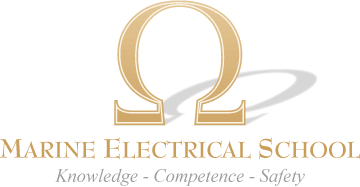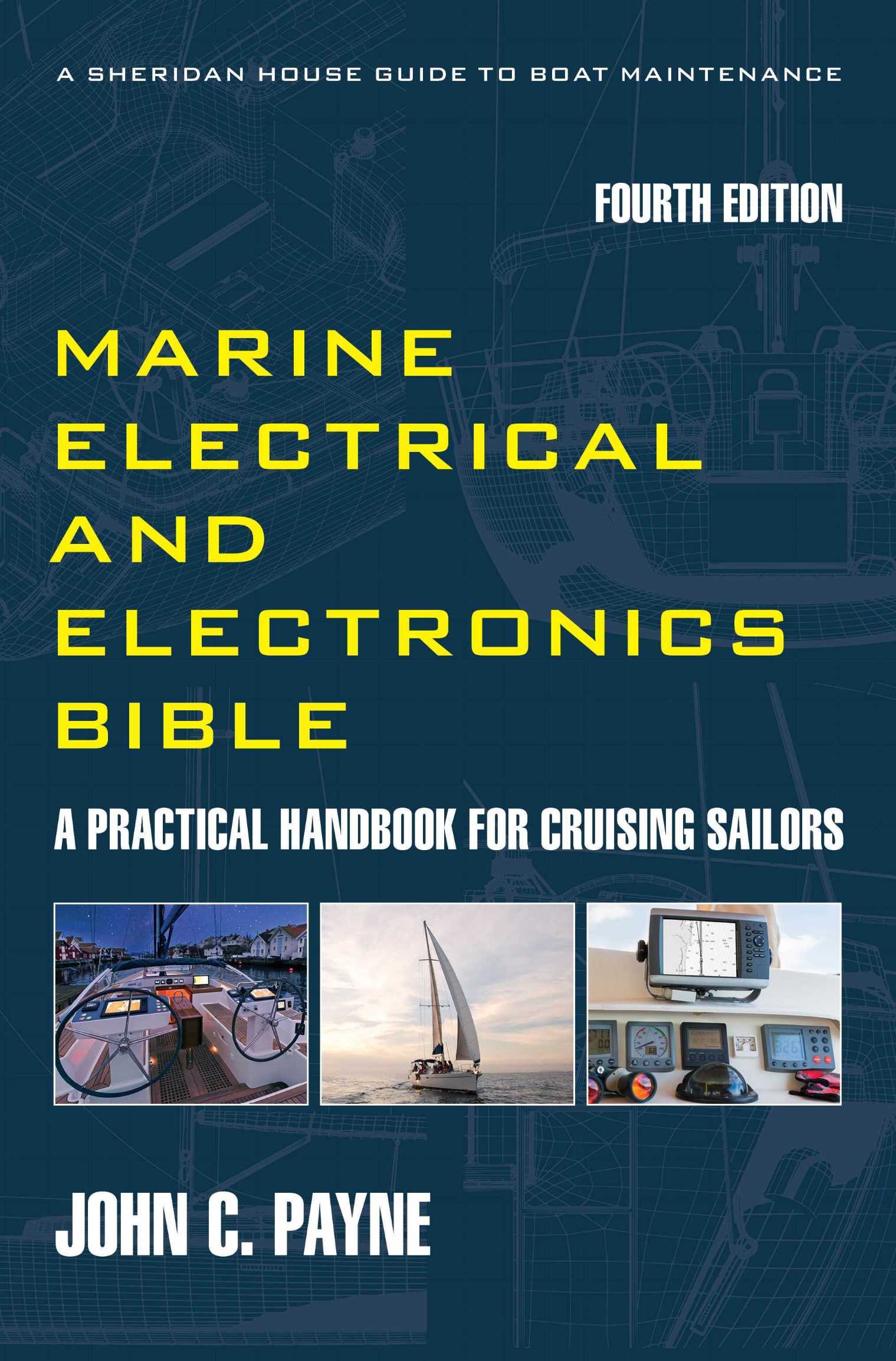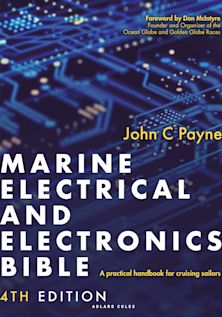Marine electrical courses online
Looking for marine electrical courses online? You have found one. The Marine Electrical School is for boat owners wanting to acquire or enhance their technical skills. Many years ago, I operated the online marine electrical school and finally after countless requests it is back. Even better is that it is now FREE with enhanced and updated material. No need for accreditation but I am considering something to have if it proves in demand for a completion certificate or statement of attainment.
After numerous requests I have relaunched revised modules in response to many who are unable to pay the exorbitant costs of professional electricians, technicians and service people. The Marine Electrical and Electronics Bible had its origins for just this same reason and now the completely revised and updated 4th Edition is out. With some additional and improved knowledge it may prevent the more unscrupulous service person from selling you needless equipment or confusing you with jargon and technical theories. Taking time to do this will save you money! The whole genesis of the book many years ago was to inform and stop being ripped off and getting substandard outcomes.

Marine electrical courses online
Similar to the previous courses which used the Motorboat Electrical and Electronics Manual as the text, these course modules use the latest 4th Edition of The Marine Electrical and Electronics Bible. Reference will be made to various chapters in the book and the content on this website will supplement that. There are numerous short courses available, often at considerable cost and these modules will offer both context and the various nuances encountered in boat electrical systems. These course modules are designed to achieve learning outcomes that will help you attain a level of knowledge that previously belonged only to your service technicians and engineers. It will also answer common questions and allow you to start your sailboat or power boat project with a good basic understanding. Enjoy marine electrical courses online
The Marine Electrical School and Myself
The original Marine Electrical School was established by myself, John C Payne. I am a professionally qualified and practicing marine electrical and electronics engineer, consultant and surveyor. I actually do this for a living, and I am not an armchair expert or self-proclaimed guru. I have owned and refitted several boats, cruised extensively and currently live aboard my 36 foot ketch. I find that the vast majority of so called marine electrical and mechanical service people have never owned a boat and are unable to apply the lived experiences we cruising people have. On my marina I get frequent knocks on the hull with folk asking for help and advice, and the fact is that in 95% of every call case the issue is identified in less than 10 minutes, without any parts required. I have seen technicians come down and take 2 hours to identify a loose wire or connection. Do the math! If I can coach you to do this yourself it is well worth it. Every time I get a help request, I learn something new and prepare notes for the next edition. You can get your copy of The Marine Electrical and Electronics Bible 4th Edition for US readers here.
Marine electrical courses online
The principal aim of the course modules is to develop basic core competencies in all areas of marine electrical and electronics. This requires a multi-disciplined approach with the development of knowledge in marine engineering and seamanship to maintain both context and relevance. The goal of the course is not just to pass an examination and get yourself a certificate but to ensure the development of relevant skills and knowledge. There are very few structured or accredited courses in marine electrical and electronics anywhere in the world. There are very few formal or mandatory certification or qualification requirements required anywhere in the world for performing DC electrical work on boats. AC work requires mandatory licensing in every country, although none are marine specific. The American Boat and Yacht Council (ABYC) in the USA have a certification scheme, and this focuses on ABYC standards and recommendations. The NMEA also have a certification scheme. This online course aims to at least make sure that boat owners are able to grasp the essential skills and maintain their own boats. Buy your copy for the UK edition of The Marine Electrical and Electronics Bible 4th Edition here. If in Australia buy your copy of The Marine Electrical and Electronics Bible 4th Edition here.
Marine electrical courses online
Reliable marine electrical and marine electronics installations require a holistic systems approach. This is all about good planning, quality equipment, simple systems design and competent installation. These course modules and my marine electrical and electronics books are all written to meet the practical requirements of the cruising yacht and power boat owner. Electrical and electronics theory is covered only to a level sufficient to properly select, install, operate, maintain and troubleshoot with a minimum of technical expertise or theory. The course is supported by The Marine Electrical and Electronics Bible 4th Edition which is your all-in-one repair manual, service manual, user manual, instruction manual and training manual. Marine electrical courses online make a difference.
The Marine
Electrical School - Basic Marine Electrical Systems
- Module 1 – Electrical History. This first introductory module gives some background information on how electricity and electronics evolved. It is important to understand some basic electrical theory before commencing a study of the more practical applications of various boat electrical equipment. This module will describe the history and basic principles of electricity that include basic atomic theory, the law of charges and electron flow as well as electrical history.
- Module 2 – Basic Electrical Theory. There are some basic theories to understand when learning about electricity. They are important when installing and troubleshooting boat systems. You will understand the definition of voltage and current and resistance, Ohms Law and how make calculations and understand the definition of Power.
- Module 3 – Basic Electrical Circuits. This module covers the essential information required to understand basic electrical circuits. After completing this lesson unit you will understand the theory of series circuits, parallel circuits and basic electrical circuits
- Module 4 – Basic Power Electronics and Semiconductors. There are many devices within systems that include diodes, transistors, LED’s, PV cells and so on. They enable everything from alternators, solar panels, and more.
- Module 5 - Basic Batteries including Lithium-ion. This module covers all the old and new battery chemistries which require understanding for power system design success.
- Module 6 – Battery Charging Systems. This includes solar, wind and water. Systems vary as do principles and these must match the battery chemistry being used.
- Module 7 – Basic Boat Wiring Systems. At the completion of this module you will understand the application and interpretation of Wiring Rules and Recommendations (ABYC, ISO, Lloyds etc); Electrical theory and wiring and the use of test instruments; How to plan electrical systems, perform load calculations, select cables, calculate voltage drop; select the required protection systems (fuses and circuit breakers). You will understand wiring installation practices, panels and switchboards, metering and grounding, and how to perform basic maintenance and troubleshooting on all of the systems. Each section will test your knowledge with short quizzes
- Module 8 - AC Electrical Power Systems. At the completion of this module you will understand AC Safety, AC Rules and Regulations, generators, generator controls, inverters, shore power systems, AC wiring, AC protection and how to perform basic maintenance and troubleshooting on all of the systems. Each section will test your knowledge with short quizzes
- Module 9 – Engine Electrics and Control Systems. At the completion of this module, you will understand basic diesel engines and systems, engine starting systems, engine instrumentation, pre-heating systems, basic ignition systems, outboard engines and charging systems and how to perform basic maintenance and troubleshooting on all of the systems. Each section will test your knowledge with short quizzes
- Module 10 - Corrosion and Lightning Protection. At the completion of this module you will understand galvanic corrosion principles, cathodic protection, electrolytic corrosion principles, isolation transformers, galvanic isolators, hull testing, lightning principles, lightning protection systems and how to perform basic maintenance and troubleshooting on all of the systems. Each section will test your knowledge with short quizzes.
- Module 11 - DC Equipment and Lighting Systems. At the completion of this module you will understand DC motors and maintenance, anchor windlasses, electric winches, navigation lighting, external lighting, internal lighting, thrusters, electric propulsion and how to perform basic maintenance and troubleshooting on all of the systems. Each section will test your knowledge with short quizzes
- Module 12 – Basic Marine Electronics. At the completion of this module you will understand how autopilots work, the principles of radar and radar reflectors, how depth sounders and fish finders operate, the principles of speed logs and wind instruments, how instrument networks operate, about interfacing, interference and how to reduce and how to perform basic maintenance and troubleshooting on all systems.
The Marine
Electrical School
It is easy to follow and if you use your own boat scenario even better. Just read the website material for each module. Reference the Marine Electrical and Electronics Bible 4th Edition where noted. I have inserted simple quizzes for self-assessment of the content. Sharing is good, so ask in detail with images of you want to and post to the forum for others to learn from. The issue with boats is we are all different and hopefully this course will identify short comings or deficiencies that can be corrected. Marine electrical courses online.


